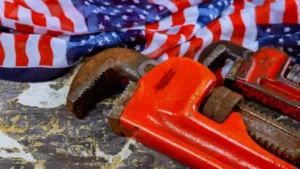Plumbing myths have been passed down through generations, leading to confusion and potential problems for homeowners. In this blog post, we aim to debunk the top 10 most common plumbing myths to provide clarity and valuable insights for maintaining a healthy plumbing system.
Myth 1: Lemons Clean Garbage Disposals
The myth that tossing lemon peels down the garbage disposal will keep it clean and fresh is pervasive. While lemons may create a pleasant scent, they won’t effectively clean the disposal. In fact, the citric acid in lemons can corrode the metal components in the disposal. To clean the disposal, it’s best to use a mixture of ice cubes and rock salt to help remove debris and odor.
Myth 2: In-Tank Cleaners Are Safe for Toilet Tanks
Many believe that drop-in toilet bowl cleaners are safe for the tank. However, these cleaners often contain chemicals that can damage the toilet’s internal components over time, leading to costly repairs. It’s best to avoid using in-tank cleaners and opt for alternative, less damaging cleaning methods.
Myth 3: All Flushable Wipes Are Safe for Plumbing
Despite being labeled as “flushable,” many wipes can still cause clogs in plumbing systems. Unlike toilet paper, which disintegrates quickly when flushed, wipes do not break down as easily and can lead to blockages in pipes and sewer systems. It’s crucial to avoid flushing anything other than toilet paper to prevent plumbing issues.
Myth 4: You Can Use Your Toilet as a Trash Can
Contrary to popular belief, toilets are not designed to handle anything other than human waste and toilet paper. Flushing items like cotton balls, dental floss, and paper towels can lead to blockages and damage to the plumbing system. These items should be disposed of in the trash to avoid potential plumbing problems.
Myth 5: Plumbing Fixtures Don’t Require Regular Maintenance
Some homeowners believe that once installed, plumbing fixtures can last indefinitely without maintenance. However, regular maintenance is crucial to prevent costly repairs and ensure the longevity of the system. From inspecting for leaks to checking water pressure, regular maintenance can help identify and address issues before they escalate.
Myth 6: A Slow Drain Isn’t a Big Deal
A frequently overlooked issue, slow drains can indicate a more significant plumbing problem. Ignoring this issue can lead to clogs and potential damage to the pipes. Slow drains are often caused by a buildup of hair, soap scum, or other debris, and addressing them promptly can prevent more severe plumbing issues down the line.
Myth 7: Loud Water Heaters Indicate Impending Failure
While noisy water heaters can be concerning, they don’t always signal imminent failure. The noise could be due to sediment buildup, which can be addressed through regular flushing and maintenance. However, it’s essential to have a professional plumber assess any unusual noises from the water heater to ensure it continues to function properly.
Myth 8: All Plumbers Provide the Same Quality of Service
Not all plumbers are created equal. It’s crucial to research and find a reputable, experienced plumber to ensure high-quality service and effective solutions for your plumbing needs. Reading reviews, asking for recommendations, and verifying a plumber’s credentials can help homeowners find a reliable professional to address their plumbing issues.
Myth 9: Over-the-Counter Drain Cleaners Are Always Effective
While convenient, over-the-counter drain cleaners can be harsh on plumbing systems and may not always effectively clear clogs. These cleaners contain strong chemicals that can damage pipes and fixtures over time. Professional cleaning and snaking by a plumber are often more reliable solutions for clearing stubborn clogs without causing harm to the plumbing system.
Myth 10: It’s Normal for Faucets to Drip
A common misconception is that a dripping faucet is a minor issue. However, it can lead to significant water waste over time and should be promptly addressed to conserve resources and avoid potential damage. A dripping faucet can indicate a worn-out washer, seal, or other internal component that needs replacing. Addressing it promptly can save water and prevent more extensive repairs in the future.
Conclusion
By debunking these common plumbing myths, we hope to provide homeowners with valuable knowledge to maintain and care for their plumbing systems effectively. Stay tuned for more informative content to keep your home running smoothly! If you require any assistance or have questions don’t hesitate to reach out to Stephens Plumbing. Our experienced plumbers in Birmingham, AL, can provide expert guidance and plumbing services. If the task seems too daunting to tackle on your own, we’re here to support you. Remember to follow safety guidelines and, when in doubt, consult Stephens Plumbing in Birmingham AL, for more complex plumbing tasks.




